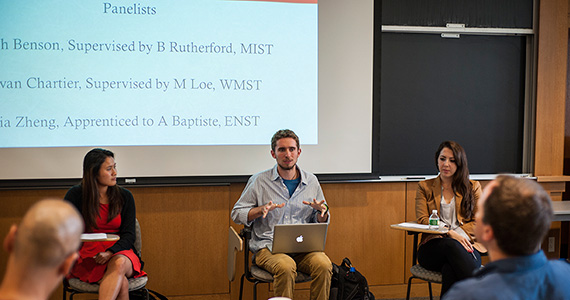
discusses his research with fellow students at a Division of University Studies event. (Photo by Anna Heil ŌĆÖ16)
░─▓╩┐¬Į▒ students are sharing their experiences with faculty members on campus and in the field. This post is by y and womenŌĆÖs studies major Evan Chartier ŌĆś14, of Oak Park, Illinois.
Almost everyone has known a nursing assistant. They might take your vitals at the hospital or help with daily activities that someone cannot do on their own. They care for our children, our sick, and our injured as well as our elderly. But, how many of us really know who these amazing individuals are, and what drives them to perform this essential work? This was the question that I set out to explore during the summer of 2013.
The first step in my journey to understanding the people behind this crucial work was to become a nursing assistant myself. So I enrolled in a nursing assistant course and traveled a daily four-hour round-trip commute to learn the skills that many of us take for granted when we are being cared for. I completed the course and am now a certified home health aide and nursing assistant.
I found that my experiences both inside and outside of the classroom were unlike those of my classmates. I embodied a level of white, American, educational privilege that was unavailable to some ŌĆö but not all ŌĆö of my fellow classmates. I neither had to wake up at 2 a.m. for a work shift before class each day, nor did I have to go to a night shift after class, like several of my peers. I did not have to come home to family or mounting piles of bills. My struggles were different.
I had never changed a brief, an adult diaper, and my first time doing so came as quite a shock. My hand did not fit into a medium-sized glove ŌĆö the only size available at my clinical internship.
I was constantly told that I could not be a nursing assistant, I must surely be a doctor or a medical school student. At the end of the day, I was doing ŌĆ£researchŌĆØ about an occupation that was, for me, a choice.
This semester, I am utilizing my summer experience, along with interviews, to construct a sociology/anthropology thesis project that challenges the perceptions of nursing assistants as homogeneous, unskilled, under-motivated, and non-aspirational women of color.
The political purpose of my study is to challenge how people perceive nursing assistants and their work, and I feel it makes my research much more than a thesis.
I have enjoyed working so closely with professors and throughout my research and thesis projects, and I feel incredibly privileged and honored to have had the opportunity to meet my diverse and inspirational peers this past summer.
I hope that my project will encourage others to feel the same way about the nursing assistants that they meet on their life journeys.
ŌĆö Evan Chartier ŌĆś14